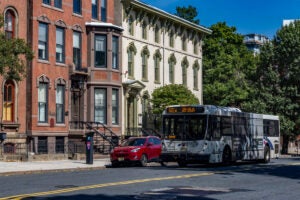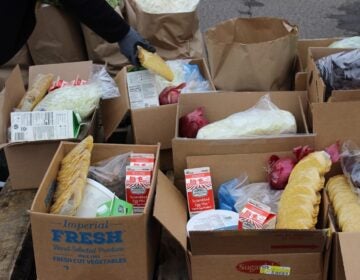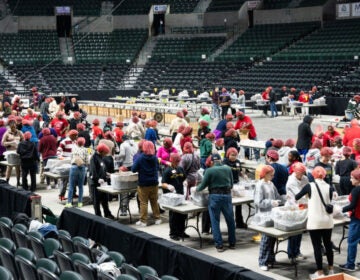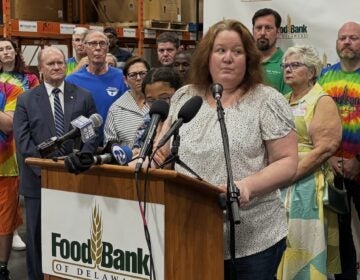SNAP cuts could devastate Atlantic City, one of New Jersey’s largest food deserts
Atlantic City food pantries brace for SNAP cuts, as one of N.J.’s worst food deserts faces rising hunger and limited grocery options.
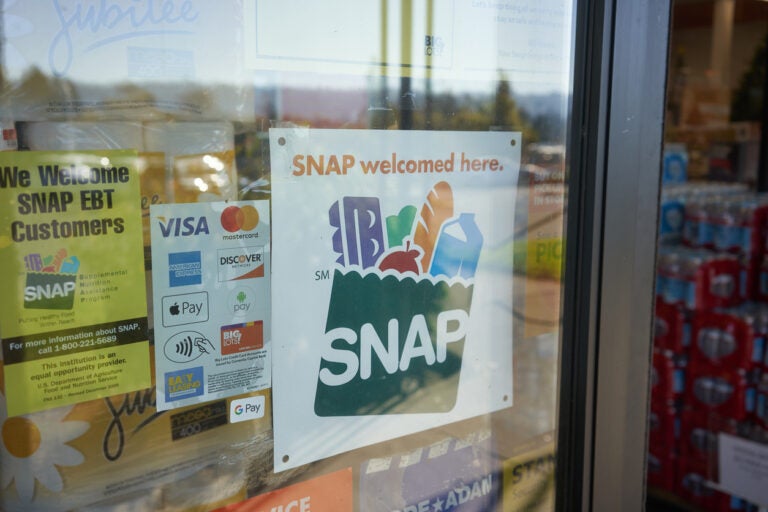
SNAP "welcomed here" sign is seen at the entrance to a Big Lots store. (FILE Photo)
Rev. John Scotland said he can see a giant wave swelling in the horizon, much like the surf that crashes onto the beaches of Atlantic County.
The wave, he warns, will strike his food pantry and soup kitchen in the form of aftershocks from President Donald Trump’s “One Big Beautiful Bill,” which slashes Supplemental Nutrition Assistance Program, commonly referred to as SNAP, benefits.
“Everybody is apprehensive and scared,” said Scotland, the executive director of the Sister Jean’s Kitchen, Pantry and Garden on Pennsylvania Avenue. “We’re not sure if the narrowing of resources has happened yet, but we know it’s coming.The [U.S. Department of Agriculture], where we get most of our protein – chicken, beef, pork – the threat is that all of that will dry up.”
Food insecurity is rampant in Atlantic City
Atlantic City is one of the epicenters for food insecurity in New Jersey. A 2022 study by the New Jersey Economic and Development Authority listed city residents living in the second-worst “food desert” region in the state.
Four of the top 10 “food desert locations” are in South Jersey, according to the study. The combined region of “North, Central and South Camden” along with Woodlynne ranked as the worst in the entire state.
A quantitative study on Atlantic City’s food insecurity crisis by the regional think tank South Jersey Forward found that the overall satisfaction with the quality of food and produce in Atlantic City was “poor.” The study also found that residents had never heard of alternatives such as mobile food trucks, and most had to rely on public transportation to reach supermarkets outside of the city to find quality food products.
Mike Suleiman, of South Jersey Forward, said not much has changed since that study. He said local leaders need to assign someone within their government to address the issue on a daily basis.
“It’s important for the city to designate someone for food insecurity,” Suleiman said, adding that a one-size-fits-all supermarket may not be the best fit for Atlantic City. “Gov. [Phil] Murphy has done that at the state level, where someone is advocating for that on a regular basis. Atlantic City doesn’t have a supermarket and that’s unacceptable.”
What are food deserts?
Food deserts are described as geographic areas, typically but not always in urban settings, where it is difficult to access affordable and nutritious food because of a lack of major grocery stores, transportation and other obstacles.
Residents living in such regions are forced to travel outside of municipalities with limited transportation options and times to purchase affordable and nourishing food, increasing the health issues and decreasing quality of life.
U.S. Rep. Bonnie Watson-Coleman, D-Ewing, said that food deserts were already affecting people of color, especially poor Blacks and Latinos, the most. SNAP cuts will only exacerbate the problem.
“This is hurting single mothers and others across the country and in pockets of New Jersey, it’s going to be very bad,” Watson-Coleman said. “New Jersey has to put in as much as possible of what is being lost.”
It’s not just the Garden State, communities and states are bracing themselves for the worse.
“Local leaders … are sounding the alarm about the dire consequences of proposed cuts to the Supplemental,” the Washington, D.C.-based Food Resource Action Center said in a statement in May.
“These mayors, city councilmembers, and municipal officials stress that SNAP is not just a safety net for vulnerable residents — it’s a critical economic driver and stabilizing force for entire communities,” the organization wrote.
Alicia “Lisa” Newcomb is the executive director of Communities Revolutionizing Open Public Spaces, or C.R.O.P.S.,, a local nonprofit that has been dealing with food insecurity in innovative ways, from community gardens and building alliances, to working directly with farmers. She said the federal changes are “scary”
“We do sit in policy update groups and if there is one silver lining is that in New Jersey, we won’t see those changes for two years,” Newcomb said. “That gives us a little time to solidify relationships with other organizations and work with the county government to find out what the plan is for what’s coming.”
This seems more permanent
Food insecurity advocates said they have seen this before. Scotland said he still remembers when Sister Jean’s Kitchen was overwhelmed by needy residents during the pandemic. But they also knew that was likely temporary until businesses reopened and people went back to their jobs.
However, this time the slashing of SNAP benefits and its effects on areas that are already starved for fresh food and nutritional alternatives seems more permanent.
“Today, we are open three days a week for three hours a day and we’re busy the whole time,” Scotland said. “We serve upward to 300 people each of those days. Our community kitchen is open from 11 a.m. to 1 p.m., Monday through Friday, and the demand there is constant. We haven’t seen a spike yet, but we know it’s in the future.”
Atlantic City residents were blindsided when a much-publicized plan to build an $18.7 million, full-service ShopRite on the island fell through, a project that was initially celebrated by Gov. Murphy and local officials at a groundbreaking ceremony in 2021.
Newcomb said they have since worked with local farmers and smaller corner grocers to improve their offerings. Since transportation is such a critical element, C.R.O.P.S. joined with its partners and created a map to help residents find the leading corner stores with the best fresh foods. The nonprofit updates the map regularly.
“Grocery shopping looks different in different neighborhoods,” Newcomb said, adding that the map helps them attack food insecurity on a street level. “We worked with one corner store to get multiple new refrigerators and that owner said he wanted to be the place where his customers can get good food.”
Scotland said that until the cuts come in, he hopes food insecurity and benefit cuts will be addressed at the local level. He added that Sister Jean’s will continue to feed people regardless of their circumstances.
“We will feed people because they are hungry,” Scotland said. “We make no judgment of whether they are worthy or not. That is what we will continue to do.”
WHYY is your source for fact-based, in-depth journalism and information. As a nonprofit organization, we rely on financial support from readers like you. Please give today.





